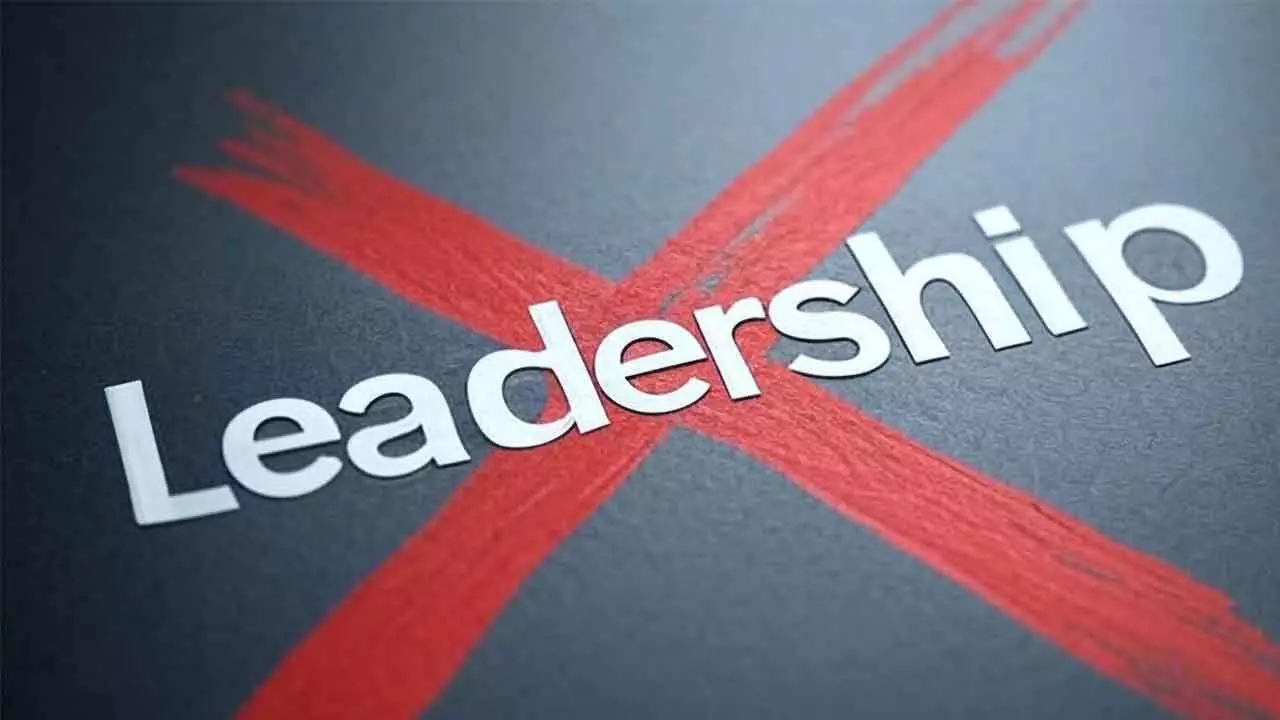What is ‘Not’ Leadership?

Leadership is often hailed as the driving force behind organisational success, but what happens when leadership fails? Select behaviours and traits undermine effective leadership.
In this column, I wish to offer a roadmap of what to avoid. Let’s dive deeper into each point, explore real-world implications, with examples, and reflect on how missteps contrast with the qualities of true leadership.
Many substandard individuals attain leadership roles through several shortcuts and convenient social ladders in organisations and demand respect as leaders. In our society, definitions have very little value, and it’s very rare that all that we believe is first defined objectively. That is why it is important to evaluate everyone in leadership roles and objectively judge them if they deserve the respect a real leader deserves.
I have, for the Nation Building Foundation, objectively developed a list of 24 behaviours that do not enable leadership. This list establishes that someone who fits these traits is a misfit to be called a ‘leader’, no matter what role the individual holds.
Being short-sighted and lacking long-term vision
Great leaders are visionaries, capable of steering their organisations toward a sustainable future. However, those who are short-sighted and focus solely on immediate results jeopardise long-term success. For instance, a CEO might push for aggressive cost-cutting measures, such as reducing R&D budgets, to boost quarterly profits. While this may appease shareholders temporarily, it can stifle innovation, leaving the company unprepared for future challenges.
A real-world example is the decline of Kodak, where leadership failed to invest in digital photography, prioritising short-term film profits instead. True leadership balances immediate needs with a strategic long-term vision, ensuring decisions align with the organisation’s broader goals.
Procrastinating to take initiatives and delaying action
Procrastination in leadership can be catastrophic. Delaying action on critical initiatives, whether due to fear of failure, indecision, or over-analysis, stagnates progress and erodes trust. Imagine a manager who delays addressing a toxic workplace culture, hoping the issue will resolve itself. Over time, the problem escalates, leading to high employee turnover and a damaged reputation.
This was evident in the case of Uber in 2017, where leadership’s delay in addressing harassment allegations led to a public relations crisis and significant leadership changes. Effective leaders act decisively and take calculated risks to keep their teams moving forward, even in the face of uncertainty.
Being self-centred and prioritising personal agenda
Leadership is about serving the collective, not the self. Self-centred leaders who prioritise their personal agenda over the team’s needs create a culture of mistrust. For example, a leader might take credit for a team’s breakthrough project to secure a promotion, leaving team members feeling undervalued. This behaviour not only demotivates employees but also stifles collaboration. Contrast this with leaders like Satya Nadella of Microsoft, who is known for fostering a collaborative culture by emphasising team success over personal gain. Authentic leaders put the organisation first, building a sense of shared purpose and loyalty.
Being petty and sweating over small stuff
Leaders who fixate on minor details, such as obsessing over formatting in a presentation while ignoring its content, lose sight of strategic priorities. This pettiness can create a tense work environment, where employees feel micromanaged over trivial matters. For instance, a manager, who reprimands an employee for a minor dress code violation during a high-stakes project meeting, risks derailing team morale. Effective leaders focus on what truly matters, letting go of insignificant issues to maintain a positive, productive atmosphere.
They understand that leadership is about guiding the big picture, not getting bogged down by the miscellaneous.
Being reactive and emotionally volatile
Emotional volatility undermines a leader’s credibility. Reactive leaders, who lash out in frustration or make impulsive decisions, create instability. Consider a scenario where a leader berates an employee publicly for a mistake instead of addressing the issue constructively.
This reaction fosters fear, reduces morale, and stifles open communication. In contrast, emotionally intelligent leaders like New Zealand’s Prime Minister Jacinda Ardern, who navigated crises with calm and empathy maintain composure, approaching challenges with a solution-oriented mindset. Emotional stability is essential for building trust and fostering a supportive work environment.
Being insecure and fearful of competent people
Insecure leaders often feel threatened by talented team members, leading them to suppress or undermine competence. For example, a manager might exclude a high-performing employee from key projects out of fear that their success will overshadow their own. This behaviour drives talent away and stifles innovation.
A notable case is Steve Jobs’ early tenure at Apple, where his insecurity led to conflicts with competent team members, contributing to his temporary ouster in 1985. Confident leaders, however, surround themselves with capable individuals, empowering them to contribute fully and fostering a culture of growth.
Owning others’ wins and disregarding contributions
Taking credit for others’ work is a leadership failure that erodes trust. When leaders claim team successes as their own, such as a manager presenting a team’s project as his/her sole achievement, they demotivate employees and breed resentment.
This behaviour was evident in the corporate culture of Enron, where leaders often took credit for subordinates’ work, contributing to a toxic environment that eventually led to the company’s collapse. True leaders celebrate their team’s contributions, giving credit where it’s due and fostering a culture of appreciation and collaboration.
Indulging in favouritism and promoting sycophants
Favouritism creates a toxic environment where merit is overlooked. Leaders who promote sycophants, those who flatter rather than contribute meaningfully, undermine fairness and competence.
For example, a leader might promote a loyal but underperforming employee over a more qualified candidate, leading to resentment and disengagement. This behaviour alienates talent and erodes trust. Leadership demands impartiality, ensuring rewards and opportunities are based on performance, and not personal bias. A fair leader fosters a merit-based culture where everyone has an equal chance to succeed.
Lacking competence and exemplary skills
Leaders must lead by example, demonstrating the skills and competence they expect from their teams. A leader who lacks expertise, such as a project manager unable to understand the technical aspects of a software development project, cannot inspire confidence.
While leaders don’t need to be experts in every area, they must possess the knowledge and skills to guide their teams effectively. For instance, a leader in a tech company should at least understand the basics of coding or product development to make informed decisions. Competence builds credibility, and exemplary skills inspire teams to strive for excellence.
Using the role, not results, to demand respect
Respect cannot be demanded through a title; it must be earned through actions. Leaders, who rely on their role to command respect, saying “Do it because I’m the boss,” often fail to inspire loyalty.
For example, a manager who insists on compliance without providing rationale or achieving results will struggle to motivate his team.
In contrast, leaders like Mahatma Gandhi and Nelson Mandela earned respect through their actions and integrity, not their titles.
True leaders focus on delivering results and building trust, understanding that respect is a byproduct of their impact, not their position.
Being abusive or abrasive to gain control
Abusive or abrasive behaviour is a cheap tactic to assert control, but it destroys team morale. Leaders who resort to intimidation, such as yelling at employees to meet deadlines, create a culture of fear.
This was evident in the leadership style of some executives at Wells Fargo during the 2016 fake accounts scandal, where aggressive tactics pressured employees into unethical behaviour, leading to widespread fallout. Effective leaders use empathy and clear communication to inspire, not intimidate, fostering a supportive environment where employees feel valued and motivated.
Being unconfident in delegating clear responsibilities
Delegation is a cornerstone of leadership, yet unconfident and insecure leaders often struggle to assign clear responsibilities. This can lead to confusion, duplicated efforts, or neglected tasks. Many political leaders indulge in such behaviours in their attempts to undermine talented young leaders.
For instance, a leader who fails to delegate tasks for a major project might overburden themselves, causing delays and burnout. Alternatively, unclear delegation can leave team members unsure of their roles, leading to inefficiencies.
Strong leaders trust their teams, providing clear direction and the autonomy to excel, as exemplified by leaders like Jeff Bezos, who empowered Amazon’s teams to innovate independently.
Avoiding accountability and blaming others for failures:
Leaders who avoid accountability and blame others for failures erode trust. For example, a leader who blames the team for a failed product launch, despite their poor planning, creates a culture of fear and defensiveness. This behaviour was evident during the USA 2008 financial crisis, where some banking executives deflected blame onto subordinates rather than owning their role in risky decisions. True leaders take responsibility for their decisions, learning from failures, and guide their teams toward solutions, which builds a culture of accountability and growth.
Micromanaging and stifling team autonomy
Micromanagement undermines team autonomy and creativity. When leaders hover over every detail, such as approving every email before it is sent, they signal a lack of trust, demotivating employees.
A real-world example is a manager who insists on reviewing every line of code in a software project, slowing down development and frustrating the team. Effective leaders empower their teams and guide while allowing freedom to innovate. This approach, seen in companies like Google, fosters creativity and drives success.
Ignoring feedback and dismissing constructive criticism
Leaders who ignore feedback or dismiss constructive criticism miss opportunities for growth. For instance, a leader who brushes off employee suggestions for improving workflow may continue inefficient practices, leading to frustration and disengagement.
This behaviour can create a culture where honest communication is discouraged. Openness to feedback is a cornerstone of effective leadership, as seen in leaders like Elon Musk, who actively seek input to refine their company’s strategies. Listening and adapting are key to continuous improvement.
Lacking empathy and disregarding team well-being:
Empathy is essential for leadership, yet some leaders disregard their team’s well-being, focusing solely on results. A leader who ignores employee burnout, such as demanding overtime without acknowledging personal challenges, leads to disengagement and high turnover. In contrast, empathetic leaders like those at Patagonia prioritize employee well-being, offering flexible schedules and wellness programs, which boost morale and productivity. Leaders who prioritise team well-being create a supportive environment where employees thrive.
Failing to communicate and leaving teams uninformed
Clear communication is the backbone of leadership. Leaders who fail to share information, such as withholding updates on organisational changes, create confusion and mistrust.
For example, during a merger, a leader who doesn’t communicate the implications to their team leaves employees feeling uncertain and disconnected. Transparent and consistent communication keeps teams aligned and motivated, ensuring everyone is on the same page.
Resisting change and clinging to outdated methods
In a rapidly evolving world, resisting change is a leadership failure. Leaders, who cling to outdated methods, such as refusing to adopt new technology, leave their organisations stagnant.
A classic example is Blockbuster’s refusal to embrace streaming, leading to its downfall as Netflix rose. Adaptable leaders embrace innovation, guiding their teams through change with confidence and clarity, ensuring their organisations remain competitive.
Prioritizing optics and focusing on appearance over substance
Leaders who prioritise optics over substance focus on appearances rather than results. For example, a leader might invest in a flashy marketing campaign while ignoring operational inefficiencies, undermining long-term success.
This superficial approach erodes credibility. True leadership emphasises substance, ensuring actions align with values and goals, as seen in companies like Tesla, where innovation drives success, not just cosmetic branding.
Undermining trust by breaking promises or commitments
Trust is the foundation of leadership, and breaking promises erodes it quickly. A leader who commits to a raise but fails to follow through loses credibility. Consistency and reliability, as demonstrated by the likes of Warren Buffett, are key to building and maintaining trust. Keeping promises fosters loyalty and ensures teams feel secure in their leader’s word.
Failing to mentor or grow talent
Leaders have a responsibility to nurture talent, yet some neglect this duty. Failing to mentor or provide growth opportunities, such as not offering training programs, stifles employee development. Strong leaders, like those at the TATA group, invest in their teams through mentorship and development initiatives, fostering growth and ensuring the organization’s future success.
Hoarding information and limiting team access to resources
Hoarding information or restricting resources creates a power imbalance. A leader who withholds critical data, such as not sharing market research with a sales team, prevents the team from performing at their best. Transparent leaders share knowledge and resources, empowering their teams to succeed and fostering a collaborative environment.
Being inconsistent and applying rules or standards unevenly
Inconsistency in applying rules breeds resentment. A leader who enforces policies unevenly, such as overlooking tardiness for a favourite employee while reprimanding others, undermines fairness. Consistent, equitable leadership ensures everyone is held to the same standards, fostering a culture of integrity and trust.
Avoiding tough decisions and shifting them on to others
Leadership often requires tough decisions, yet some leaders avoid this responsibility. For example, a leader who defers a decision on layoffs to HR without providing input shirks his/her duty, leading to poor outcomes. Courageous leaders step up, making difficult calls with clarity and conviction, ensuring the organization’s needs are met.
Conclusion
The NBF’s list of ‘What is ‘NOT’ Leadership?’ offers a powerful lens to evaluate and improve leadership practices. From being short-sighted and self-centred to lacking empathy and resisting change, these missteps highlight the importance of self-awareness in leadership.
By avoiding these pitfalls, leaders can cultivate trust, inspire their teams, and drive meaningful progress. True leadership is not about perfection but about learning from mistakes and striving to embody the qualities that uplift and empower others.
Through reflection and intentional growth, leaders can transform these ‘NOTS’ into the building blocks of exceptional leadership.
(The writer is Chairman of the Nation Building Foundation, a Harvard Business School certified strategist, and a leadership coach)








